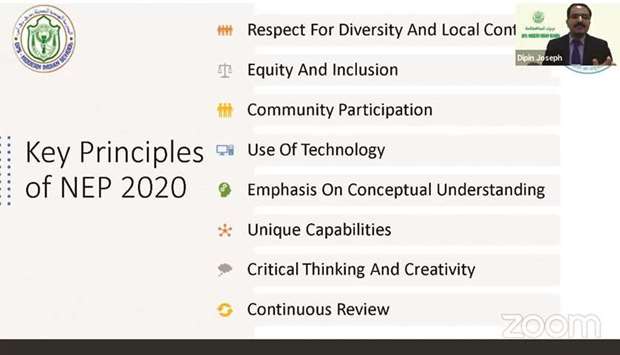Around 1,000 people attended a webinar organised by DPS-Modern Indian School on ‘National Education Policy (NEP) 2020’ for parents on March 1 under the directives of the Central Board of Secondary Education, India, with an aim to acquaint them with various aspects, changes and recommendations, and highlight their roles in the holistic development of the global citizens of tomorrow.
Addressing the gathering, Principal Asna Nafees said that NEP 2020 is a well- researched policy and develops a conscious awareness of one’s role and responsibilities in the interconnected, diverse and rapidly changing world.
The key features of NEP include integration of subjects, seamless knowledge, experiential learning, inclusive learning environment with a learner centric and hi-tech approach to prepare the students for future challenges and fostering 21st century competencies.
She advised the partners in education to read the policy so that they can contribute significantly in developing positively contributing global citizens.
Resource person, Dipin Joseph, faculty- DPS-Modern Indian School, briefed the attendees on the new and forward-looking vision of the education policy along with its distinctive principles, objectives and salient features of different stages in school ranging from foundation stage to secondary level.
With a paradigm shift in pedagogy and approach, NEP lays emphasis on conceptual understanding, critical thinking and creativity, fostering the unique capabilities of each student, respect for diversity and local context, equity and inclusion, continuous review, community participation, extensive use of technology in order to develop 21st century skills among the learners.
Introduction of vocational education right from class VI with internships and experiential learning, multilingual approach, integration of curricular, co-curricular and extra-curricular curriculum to boost originality of thinking and strengthen the education process are the steps initiated to reduce drop-outs and improve literacy levels.
The holistic, 360 degree report card, as envisaged in the NEP, would allow students to assess their own progress and allow them to identify and rectify weak points.
Altogether the policy is holistic, comprehensive, futuristic and learner centric and is focused on preparing the youth for an inclusive and sustainable world.
The session was live streamed on the official Facebook page of the school.
Faculty member Parvathy Gopalkrishnan was the host.
The key features of NEP include integration of subjects, seamless knowledge, experiential learning, inclusive learning environment with a learner centric and hi-tech approach to prepare the students for future challenges and fostering 21st century competencies.
She advised the partners in education to read the policy so that they can contribute significantly in developing positively contributing global citizens.
Resource person, Dipin Joseph, faculty- DPS-Modern Indian School, briefed the attendees on the new and forward-looking vision of the education policy along with its distinctive principles, objectives and salient features of different stages in school ranging from foundation stage to secondary level.
With a paradigm shift in pedagogy and approach, NEP lays emphasis on conceptual understanding, critical thinking and creativity, fostering the unique capabilities of each student, respect for diversity and local context, equity and inclusion, continuous review, community participation, extensive use of technology in order to develop 21st century skills among the learners.
Introduction of vocational education right from class VI with internships and experiential learning, multilingual approach, integration of curricular, co-curricular and extra-curricular curriculum to boost originality of thinking and strengthen the education process are the steps initiated to reduce drop-outs and improve literacy levels.
The holistic, 360 degree report card, as envisaged in the NEP, would allow students to assess their own progress and allow them to identify and rectify weak points.
Altogether the policy is holistic, comprehensive, futuristic and learner centric and is focused on preparing the youth for an inclusive and sustainable world.
The session was live streamed on the official Facebook page of the school.
Faculty member Parvathy Gopalkrishnan was the host.

